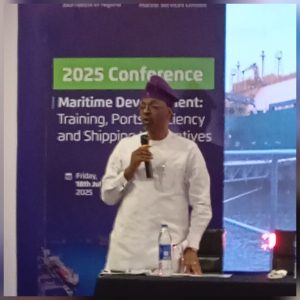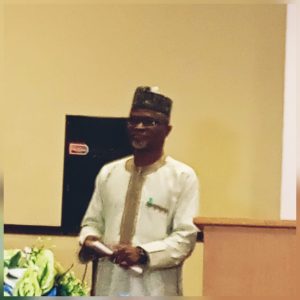The Nigerian Shippers’ Council (NSC) has presented a comprehensive strategy to establish a Standard Regulatory Framework in the maritime sector, aimed at harmonizing port operations, reducing logistics costs, and aligning Nigeria’s ports with global best practices.
The Executive Secretary/CEO of the Council, Dr. Pius Akutah made this known at the 2025 Association of Maritime Journalists of Nigeria (AMJON) conference, with the theme “Maritime Development: Training, Ports Efficiency and Shipping Imperatives”.
Represented by Moses Abere, Acting Director, Special Duties and the Deputy Director, Regulatory Services, Ibrahim Mohammed, Dr Akutah highlighted the inefficiencies in Nigeria’s port operations, citing the country’s poor ranking in the World Bank’s Logistics Performance Index (LPI).
He emphasized the importance of a standard regulatory framework, noting that “a standard regulatory framework is not just a technical necessity—it is an economic imperative.”
The NSC’s proposed framework includes codified regulations, regularly updated and published, transparent tariffs and sanctions, single-window digital platforms to reduce redundancy, active stakeholder participation, and the adoption of blockchain and APIs to centralize compliance monitoring.

To achieve this, the Dr Akutah outlined plans for institutional reforms to harmonize roles among major port agencies, digital integration through a Port Community System (PCS), capacity building for compliance officers and auditors, stakeholder engagement through a Quarterly Regulatory Roundtable, and performance monitoring through monthly regulatory scorecards.
The NSC also recommended the establishment of a Maritime Economic Tribunal for dispute resolution and emphasized the importance of legislative reforms, particularly the passage of the Nigerian Ports Economic Regulatory Authority (NPERA) Bill.
The NSC’s roadmap reflects a clear vision for a modern, transparent, and efficient maritime regulatory environment.

Through institutional realignment, technological investment, and inclusive governance, Nigeria can unlock its port sector’s full economic potential and prepare for broader continental trade under the AfCFTA.









Comment here